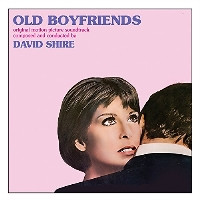- Composed by David Shire
- Intrada / 2015 / 32m
A romantic drama from 1979, Old Boyfriends followed a woman (Talia Shire) trying to make sense of her life by revisiting her past relationships (with Richard Jordan, Keith Carradine and John Belushi, making his debut in a dramatic role). The film was the directorial debut of Joan Tewkesbury but was not a success and the rest of her career has been spent in television. It wasn’t entirely without praise from critics (especially for Shire, in her first big role since Rocky) but is long forgotten by most today.
The music came courtesy of the lead actress’s then-husband, the great David Shire, in the middle of probably the most fertile period of his career. Of course it presented him with the unusual scenario of having to write music for love scenes featuring his wife, which must have been interesting to say the least. His score has never been released before (the record planned at the time was cancelled) though its main theme has become a staple of his concerts and on compilation albums, not without reason.
It’s a love theme but actually when it’s first heard over the main title (and again later in the score in “Motel Mirror / To Minneapolis”) it’s presented in an aggressive, dynamic, action-orientated arrangement with no small hint of Bernard Herrmann to it; that version is vintage 1970s dramatic music, propulsive and pacy. There’s a kind of frenzied energy to it which is brilliantly effective.
The first of the old boyfriends gets a delicate, warm theme in “Love Scene: Dianne and Jeff”; the next more of a pop flavour, with “Love Scene: Dianne and Eric” suggesting Beethoven’s “Moonlight Sonata” but a pop ballad emerging from that, with very 70s drums and saxophone, a little like the idea of “Whiter Shade of Pale” as the composer himself says in the liner notes. The main theme itself is used in superbly lilting style for the final encounter, “Love Scene: Dianne and Wayne”, the viola solo out-of-this-world beautiful, having also received a gorgeous treatment in “To Luddington”.
“Luddington Walk” is a sumptuous piece also, such delicate colours balancing together in a piece of longing and beauty. At the other end of the scale is the awkwardly-titled “The Return / The Bathtub / Homecoming” with its jabbing, stabbing brass and winds and piano crashes (not a million miles from Herrmann, again) in the first portion before an awkward kind of twisted piano lullaby. Shire then provides closure in the rousing “Jeff Returns / Finale” before another reprise of the main theme for the end credits.
You can rarely go too far wrong if you buy a David Shire album but this must rank as one of his best, a perfect little romantic journey packed with great melody. There’s a risk that the film being relatively unknown means people will let it pass them by; that would be a mistake. Intrada’s album is exactly as the planned soundtrack album from 1979, minus the John Belushi songs which were to have been placed at the end, and sounds just wonderful, Dan Wallin’s recording being of particular note. This is prime David Shire, an essential purchase for anyone who likes his music.
Rating: *****
facebook.com/moviewave | twitter.com/MovieWaveDotNet | amazon.com













It‘s quiet in here! Why not leave a response?